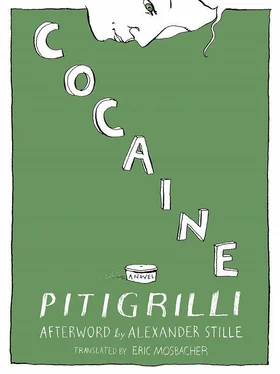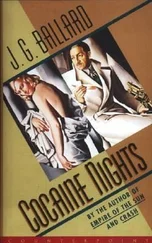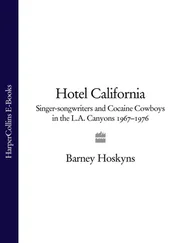But what baffled him was why those steaks and enemas had not killed him out of hand.
In the hands of these three doctors he felt as if he were being held by the feet by three acrobats hanging from the ceiling at a circus and being thrown from one to the other over long distances, turning giddy somersaults on the way, and his impression was that it was pure chance that they always caught him.
He was awakened from his meditation by Nocera and Maud, who gently ushered him into the cold bath.
“It’s awful,” Tito groaned, struggling and with his teeth chattering.
“Be patient, old man.”
“Be patient, my love.”
“Just another minute,” said the landlady with a watch in her hand.
“It’ll bring down your temperature,” Nocera said.
“It’ll make you better,” Maud said.
They quickly dried him and put him back to bed; he was as livid as a drowned man.
“You’ll soon get warm again, darling,” said Maud.
But instead of getting warm he felt colder in bed than in the bath, and he had a stabbing pain in the region of his right rib.
And he coughed.
Then he coughed again.
Then he spat blood.
The first doctor, who arrived soon after he was taken out of the bath, said that the stabbing pain in the ribs was merely an intercostal pain.
The famous doctor, the luminary of science, reassured everybody by saying: “It’s nothing. It’s a bone abscess characteristic of typhoid. Even an army medical officer would know that.”
But Tito knew that he had caught acute pneumonia in the bath.
When he started spitting blood the doctors silently withdrew, and Maud hurried out to fetch them back.
And Tito saw a priest in front of him, black and solemn, talking to him with a more than human voice.
“Who sent for you?” the patient said.
“No one,” the landlady lied.
“Priests can smell when someone’s dying,” Tito said in a little trickle of a voice. “They’re like the flies that lay their eggs in the nostrils of the dying. But, as he’s here, let him stay.”
The priest showed him a crucifix and made him say a prayer under his guidance.
“Listen, father,” Tito said. “There’s a box in that drawer with a photograph in it. Please bring it to me.”
The priest brought him the box, and Tito took from it the photograph of Cocaine in the nude.
“You’re going to tear it up, I hope,” the priest said, his eyes nearly popping out of his head.
“No,” Tito said with a laugh. “I want to look at it for the last time.”
“But in this last hour God is near your bed,” His minister said warningly.
“Good. Then He can look at it too.”
“And now you will confess,” said the priest, seizing the obscene photograph and putting it between the pages of his breviary.
“Confess? Is that laxative lemonade for the soul really necessary?”
“Don’t blaspheme, wretched man.”
“Go away, you fool.”
And he turned over on to his side, turning to the priest that part of his body into which three thousand million bacteria (Wright’s vaccine) had been injected.
The priest left. Halfway down he opened his breviary and blushed.
Nocera came in with an aunt of Tito’s, a horrible woman whom he rarely saw. In every family there’s at least one horrible aunt. There’s one in mine too.
She was glad that Tito was dying, but wept hot tears all the same.
“If you’re weeping it means I shall get better,” Tito said to her. “If I were going, you’d be laughing for joy.”
A man came in with three oxygen cylinders.
“Three? Why three?” the aunt who was one of those horrible aunts that they have in every family, including mine, wanted to know. “Why did you order three? Supposing he only uses two? Will the chemist take the other one back?”
“Yes, he will.”
“And will he give you the money back?”
“Listen, Nocera,” Tito exclaimed with his last remaining breath. “Get rid of this dreadful woman for me, otherwise I’ll get my own back on her. I’ll pay her the dirty trick of not dying.”
The high priest of medical science walked in.
“How are we, are we feeling better?” the illustrious doctor said, taking Tito’s pulse. “Are we feeling better?”
“Yes, we are, we’re going.”
And he died.
Nocera, Maud and the landlady went down on their knees round the bed, with their heads on the bedclothes, just as in the prints showing the death of Anita Garibaldi or Camillo Benso, Count of Cavour.
And that’s how one can get better after swallowing typhoid bacteria and being treated for septicemia and then for Malta fever. And that’s also how one can die of pneumonia after undergoing the classical treatment for typhoid.
When Pietro Nocera opened the will the only other person present was Maud. Her eyes were red from weeping.
Tito had stated clearly that he was going to kill himself, and he had killed himself for her.
This was the first time that Maud had ever felt remorse.
“If I had been more faithful to him, or had made him think I was faithful, he would now…”
“Forget it,” Nocera said to her. “Remorse is the most useless thing. You’d do better to go home and sleep. I’ll see to all the funeral arrangements.”
Maud once more kissed Tito’s brow, put a little rouge on her lips and went home to the room facing the courtyard that had been hers when she was a girl, the room to which an appetizing smell of good upper-class cooking floated up from the floors below.
Her father, with the respect due to her grief, asked whether there wasn’t a mid-season overcoat among the deceased’s belongings.
The official physician whose duty it was to ascertain the cause of death called at the deceased’s address and left again immediately, and a priest called and stayed for half an hour.
“My poor friend was an atheist,” Nocera pointed out.
“The deceased does not have to have been a believer,” the priest said, “It’s sufficient if the survivors are believers.”
“I really —”
“Not you, but…”
“Well, how much does it cost?”
“Twenty-five lire for each priest.”
“How many priests are necessary to make a satisfactory show?”
“At least eight.”
“That makes two hundred lire.”
“Then there are the nuns.”
“How much are they?”
“Two lire each with used candles, three lire with new candles.”
“And how many are needed?”
“About a hundred.”
“That makes two hundred lire.”
“But not with new candles.”
“As they have to be lit, it seems to me not to matter very much if they have been lit before.”
“You must add fifty lire for the carpets to lay at the church door.”
“Is that necessary?”
“It’s essential. Then there’s the mass and the benediction.”
“Can’t you give me an all-in price? What’s the least for which you can do it?”
“Mass, benediction and carpets, a hundred lire, not including the priests and nuns.”
“Very well, then.”
“Will you give me something on account of expenses?”
“Will two hundred be enough?”
“Yes.”
“Will you see to everything?”
“Yes. Will four o’clock tomorrow afternoon be all right?”
“Yes, Father. But how can mass be celebrated at four o’clock in the afternoon if it has to be said on an empty stomach?”
“We take it in turn to fast.”
Next the undertaker’s representative arrived to make arrangements for the hearse and the trappings for the horses. Nocera telephoned the cremation society, who sent a representative, and a musician also called.
Читать дальше



